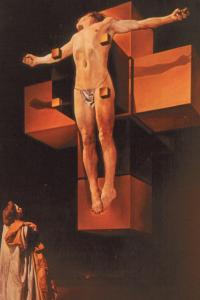 October 31, the eve of All Saints, is not just Halloween. It’s also Reformation Day. Protestants celebrate this festival to remember the date when Martin Luther nailed 95 Theses on the chapel door of Wittenberg Castle. This lit the fuse on a bang heard ‘round the world for five centuries.
October 31, the eve of All Saints, is not just Halloween. It’s also Reformation Day. Protestants celebrate this festival to remember the date when Martin Luther nailed 95 Theses on the chapel door of Wittenberg Castle. This lit the fuse on a bang heard ‘round the world for five centuries.
The central tenet of the Lutheran version of the Protestant Reformation is concise: we are justified by faith. That’s it! Nothing more!
For John Calvin, justification-by-faith is the “main hinge on which religion turns” (Calvin 1960, 3.11.1). For Martin Luther justification-by-faith is the articulus stantis et cadentis ecclesiae, the article by which the church stands or falls (Kolb 2000, p.301).
Followers of both Luther and Calvin stress that we are justified by God’s grace present in faith, and not by our own works, accomplishments, or merits. Our salvation is a gift. And this gift requires no act on our part. It requires only something that God does out of grace and mercy, namely, God forgives our sins and renders us just even though we are still sinners. This is the theological meaning of the gospel of Jesus Christ, according to the Reformers. This meaning is significant for believers within the church as well as for the public outside the church. Getting clear on the gospel is worth the effort.
Is Faith just one more work?
Might this be confusing? It seems that faith is requisite for justification and salvation. Yet, our own works and merits are excluded. So, does faith become just another human work that merits God’s response of grace? This makes my head hurt.

Romans 1:17 is the hinge on which the Reformation door opens wide: “For in it the [dikiosyne, justification or righteousness] of God is revealed through faith for faith; as it is written, ‘The one who is righteous will live by faith’.” The Reformation insight swings on this hinge: It is God’s faith in us rather than our faith in God which justifies and, thereby, saves. So the theologian asks: just what dimension of faith is it that makes faith justifying? (Painting by He Qi, China, 1999)
Faith as Belief
Is it our knowledge of God combined with our belief in Jesus Christ which justifies us and, therefore, merits our salvation?
Belief is indispensable to leading a Christian life. Paul and Silas said, “Believe in the Lord Jesus, and you will be saved—you and your household” (Acts 16:31). Maybe it’s faith understood as belief that earns us our salvation? Belief is an act we perform with our mind. Does believing the right things justify?
Curiously, in this Acts account, only one person is asked to believe. Yet, an entire household—a household that likely includes some nonbelievers–enjoy the gift of salvation. How does that work? My head hurts even more.
Evangelical theologian and Patheos columnist, Roger E. Olson, has been peppered with variants on this question: what does a person have to believe in order to be saved?
In the process of answering, Olson admits that this is not simple. He waves before us caveats and conditions and qualifications. Then, he concludes:

Remember, the question is about cognitive knowledge and belief, so I will go out on a limb here and say that, based on all that Scripture says about the subject, being authentically Christian requires knowledge about Jesus being the Son of God and God the Son, God incarnate, his saving death and resurrection (including the empty grave), repentance and trust in him, and a commitment to live according to ‘his way’—his teachings and his example.
Notice that Olson shifts the question from how to be saved to how to be authentically Christian. Yes, indeed, authentic Christian faith requires right belief along with other commitments.
While my head is hurting, I wonder. Does God do a survey of believers and nonbelievers? Does God ask the Holy Spirit to serve as an inquisitor, measuring each individual’s beliefs according to a heresy standard? What if I believe something wrong? Does God limit handing out salvation only to believers who pass an orthodoxy test?
Oh no, what if I believe something that is wrong? Woe is me!
No. This cannot be the case. Finnish-American theologian Kirsi Stjerna rejects this logic. “Faith in [the Reformation] view is a gift and not a matter of right doctrinal belief” (Stjerna 2021, p.65). Your or my belief itself does not justify. God justifies. But, how?
Faith as Trust
If justification is not the result of accurate knowledge and orthodox belief, then might it be faith as trust that justifies? If right belief is something we do with our minds, then trusting God is something we do with our hearts.
“The word ‘faith’ is to be understood not as knowledge…but as trust that consoles and encourages terrified minds,” says the Augsburg Confession (Articles 19 and 23). Citing Hebrews 11:1, Ulrich Zwingli trumpets that faith “is the strength and assurance and certainty whereby the soul trusts inflexibly in the unseen God” (Zwingli 1953, p.246). In short, we turn our lives over to God in trust.
Yet, my hurting head surmises that it takes a great deal of work to move from the mind to the heart. John Calvin reminds us that our hearts are reluctant to trust in God.

If it is true that the mind’s real understanding is illumination by the Spirit of God, then in such confirmation of the heart his power is much more clearly manifested, to the extent that the heart’s distrust is greater than the mind’s blindness. It is harder for the heart to be furnished with assurance than for the mind to be endowed with thought. (Calvin 1960, 3.2.37)
As you can see here, for Calvin the mind is moved to assent to pure doctrine by the inner work of the Holy Spirit. The Holy Spirit witnesses within our soul to the truth of God’s Word in Scripture. In addition to enlightening our mind in this way, the Holy Spirit works within us to move the heart toward accepting God’s invitation to trust. This second operation is more difficult, presumes Calvin, because the heart is more resistant. The heart would prefer to trust itself rather than God. How can we get our heart over the hump so that we trust God more than we trust ourself? Whew! That’s a lot of work.
What if my trust is weak? Do I lose my salvation? Do I forfeit my justification? I tremble in fear.
Now let us ask: is it the trust dimension of faith that justifies us? No. Trusting, like believing, is an activity that could at most lead to self-justification. The heart of justification-by-faith is that it is a gift of God’s grace. There must be a dimension of faith that is not a human an action. There must be a dimension of faith that is God’s gift. That gift is the indwelling presence of Jesus Christ. To this we now turn.
Faith as the Indwelling Presence of Christ
On the one hand, Reformation theologians emphasize that our eternal justice and, hence, our justification come to each of us as a gift from beyond ourselves, extra nos. On the other hand, these same Reformers emphasize the indwelling presence of Christ, intra nos. “Christ is not outside us but dwells within us,” writes Calvin (Calvin 1960, 3.2.24). Can we affirm both? Yes. The extra nos justice is a gift the Holy Spirit places within us, intra nos. It is the justice of Jesus Christ, the one scapegoated for the sake of somebody else’s self-justification, that is made present by God’s grace in our faith.
In answer to the question–how does faith justify?—many in the Reformation tradition contend that God “imputes” righteousness to sinners, righteousness that we sinners do not deserve.
Known as the forensic model of justification, this model appeals to legal metaphors wherein we, who are guilty, are declared by God to be innocent. This imputation of righteousness is an act of divine grace, to be sure.
Yet, the forensic concept of imputation does not provide a sufficiently complete explanation. It applies divine justice extra nos to the unjust sinner, but the forensic model deletes from the event of justification the real presence, intra nos.

Here is a key statement by Luther. “It [faith] takes hold of Christ in such a way that Christ is the object of faith, or rather not the object but, so to speak, the One who is present in the faith itself” (sic ut Christus sit obiectum fidei, imo nonn obiectum, sed, ut ita dicam, in ipsa fide Christus adest) (Luther 1955-1986, 26:129). This indwelling presence of Christ in the person of faith is the work of the Holy Spirit, adds Calvin. “The Holy Spirit is the bond by which Christ effectually unites us to himself” (Calvin 1960, 3.2.24). (Painting by Salvador Dali)
Faith, I contend, improves the quality of our daily life. To have faith in Jesus Christ makes us less anxious, less nervous, less defensive, more kind, more considerate, more loving. We can then enjoy the fruits of the Spirit, as St. Paul lists them: “love, joy, peace, patience, kindness, generosity, faithfulness, gentleness, and self-control” (Galatians 5:22).
How does faith accomplish this? The main contribution of faith, I believe, is that faith removes the need for self-justification. Because Christ himself has become a twin within our soul, Christ energizes and directs our compassion, our loving, our caring. My head hurts a lot less now.
Church leaders ring their hands over the failure of previous generations to value as precious the inner life of faith. Why are young people absent from worship? Because youth workers start with tennis shoes, guitars, and pizza rather than with faith and transformation. At least this is what Patheos columnist Jack Lee says in a thought-provoking article, “Why and Entire Generation of Youth are Finding Evangelical Churches Inadequate.” He writes, “Instead of hoping the outward would change the inward, churches should have focused on the inward (justification) changing the outward (sanctification).”
I pay theological homage to the new Finnish school of Reformation research led by the late Tuomo Mannermaa. Christ–and therefore also his entire person and work–is really and truly present in the faith itself (in ipsa fide Christus adest)” (Mannermaa 2005, p.5).

Kirsi Stjerna, heir to the Mannermaa school, marks this transformation with the term, liberation. We are set free by the gift of justification. “Luther’s major insight was that justification is a grace event where one is gifted freedom and forgiveness, solely by the act of Christ, who has made the reconciliation between God and human possible” (Stjerna 2021), p.65).
Conclusion
My head has been hurting due this question: If justification-by-faith is a gift of God’s grace and not a work that we perform to trigger our salvation, then how should we understand this? Is it the belief dimension of faith the justifies? No, because belief is a work. Is it then the trust dimension of faith? No, because trusting is just one more human action. Might it then be the indwelling of Christ in our faith? Yes, that’s it. Christ dwells within us because the Holy Spirit places Christ within us.
Belief and trust belong to faith, to be sure. Yet it is the third, the presence of Christ within the person of faith, that we can connect with God’s justification of us. Christ’s presence is a gift of God’s grace. So is justification. So is salvation.
The theology of Christ’s indwelling presence goes like this. Jesus died as a just person. He is in himself just; so he needs no self-justification. When the Holy Spirit places the just Jesus within our faith, Jesus’ justice becomes our justice. He has justified us, so to speak. Our justification is a divine gift, not the product of our self-affirmation.
When you put your mask on this Halloween, pause for a moment. Remember the Reformation. Offer God a “thank you” for the divine grace the lives 24-7 within your soul.
▓

Ted Peters is a Lutheran pastor and seminary professor. His fields of teaching and writing include public systematic theology as well as the dialogue between faith and science. He is author of a one-volume systematic theology, God—The World’s Future (Fortress, 3rd ed., 2015) and Sin Boldly! (Fortress, 2015). Visit his website: TedsTimelyTake.com.
▓
Works Cited
Calvin, John. Institutes of the Christian Religion, 2 Volumes. Louisville KY: Westminster John Knox, 1960.
Kolb, Robert and Timothy Wengert, eds. The Book of Concord. Minneapolis MN: Fortress, 2000.
Luther, Martin. Luther’s Works, American Edition, 55 Volumes. St. Louis and Minneapolis: Concordia and Fortress, 1955-1986.
Mannermaa, Tuomo. Christ Present in Faith: Luther’s View of Justification. Minneapolis MN: Fortress, 2005.
Peters, Ted. God–The World’s Future: Systematic Theology for a New Era. 3rd. Minneapolis MN: Fortress Press, 2015.
Peters, Ted. “Public Theology: Its Pastoral, Apologetic, Scientific, Politial, and Prophetic Tasks.” International Journal of Public Theology 12:2, 2018: 153-177; https://brill.com/abstract/journals/ijpt/12/1/ijpt.12.issue-1.xml.
Peters, Ted. “Resistance of Self-Justification to God’s Grace.” Currents in Theology and Mission, 2019: 46:1: 58-68.
Stjerna, Kirsi. Lutheran Theology: A Grammar of Faith. Edeinburgh: T & T Clark, 2021.
Zwingli, Ulrich. An Exposition of teh Faith in Zwingli and Bullinger. Louisville: Westminster John Knox, 1953.













